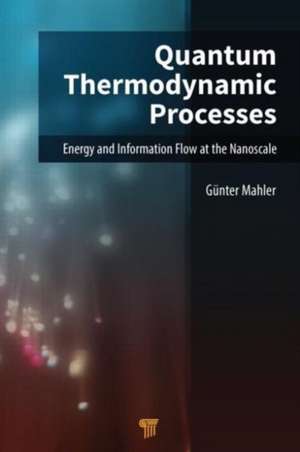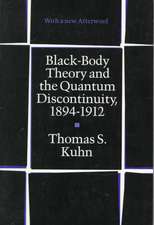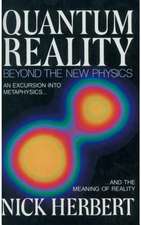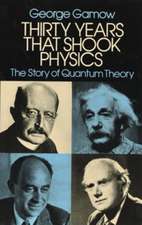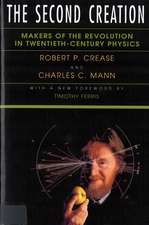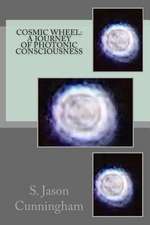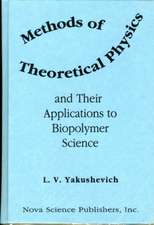Quantum Thermodynamic Processes: Energy and Information Flow at the Nanoscale
Autor Guenter Mahleren Limba Engleză Hardback – 19 dec 2014
Why does the world around us typically look thermal—from cosmology down to individual embedded spins? Do informational measures constitute additional (independent) parameters beyond physical ones? Is the transition between mechanical and thermal systems gradual or discontinuous? Pertinent examples can be found in various processes implemented on small quantum systems. Particularly attractive are model systems that can be treated thermodynamically, but—to some extent—also exactly, that is, based on pure quantum dynamics. This possibility opens the door to nano-thermodynamics. In this sense, the book aims at a modern perspective of nanoscale applications, defined here as a potential realization of various functions as constrained by given resources.
Preț: 830.82 lei
Preț vechi: 1109.20 lei
-25% Nou
Puncte Express: 1246
Preț estimativ în valută:
158.100€ • 165.38$ • 131.26£
158.100€ • 165.38$ • 131.26£
Carte tipărită la comandă
Livrare economică 15-29 aprilie
Preluare comenzi: 021 569.72.76
Specificații
ISBN-13: 9789814463737
ISBN-10: 9814463736
Pagini: 486
Ilustrații: 66
Dimensiuni: 152 x 229 x 30 mm
Greutate: 1.06 kg
Ediția:1
Editura: Jenny Stanford Publishing
Colecția Jenny Stanford Publishing
ISBN-10: 9814463736
Pagini: 486
Ilustrații: 66
Dimensiuni: 152 x 229 x 30 mm
Greutate: 1.06 kg
Ediția:1
Editura: Jenny Stanford Publishing
Colecția Jenny Stanford Publishing
Public țintă
Academic and PostgraduateCuprins
Introduction. Information. Quantum Physics. Thermodynamics. Quantum Thermodynamics. Finite Processes. Control Cycles. Continuous Operations. Outlook.
Notă biografică
Günter Mahler obtained his doctorate in theoretical physics in 1972 and habilitation in theoretical physics in 1977 from the University of Regensburg, Germany. Since 1978, he was professor of theoretical physics at Institut für Theoretische Physik I, Universität Stuttgart, Germany, from where he retired in 2011. From 2004 to 2010, he was dean for international studies at the Faculty of Mathematics and Physics, Universität Stuttgart. Prof. Mahler’s research interests include quantum system theory, quantum stochastics, quantum networks, quantum control, quantum measurement and sensorics, quantum information processing, quantum thermodynamics and quantum transport, and quantum thermodynamical machines.
Recenzii
"This book of Günter Mahler, an early contributor to the field of quantum thermodynamics, comes at the right time to provide insights into this exciting field at the intersection of information theory, quantum mechanics, and statistical mechanics."
—Prof. Martin B. Plenio, University of Ulm, Germany
"This interesting book by one of the pioneers of quantum thermodynamics provides an in-depth discussion of two main statistical theories (information theory and quantum mechanics) and relates them to the major macroscopic theory, viz. thermodynamics. The presentation is based on ‘big questions,’ issues that drive the foundation research and can eventually display the very limits of studied theories. Thus this book not only describes the existing results, but also tends to guide the future research."
—Dr. Armen E. Allahverdyan, A. Alikhanyan National Laboratory, Armenia
—Prof. Martin B. Plenio, University of Ulm, Germany
"This interesting book by one of the pioneers of quantum thermodynamics provides an in-depth discussion of two main statistical theories (information theory and quantum mechanics) and relates them to the major macroscopic theory, viz. thermodynamics. The presentation is based on ‘big questions,’ issues that drive the foundation research and can eventually display the very limits of studied theories. Thus this book not only describes the existing results, but also tends to guide the future research."
—Dr. Armen E. Allahverdyan, A. Alikhanyan National Laboratory, Armenia
Descriere
Why does the world around us typically look thermal—from cosmology down to individual embedded spins? Is the transition between mechanical and thermal systems gradual or discontinuous? Pertinent examples can be found in various processes implemented on small quantum systems. Particularly attractive are model systems that can be treated thermodynamically, but—to some extent—also exactly, for example based on pure quantum dynamics. This possibility opens the door to nano-thermodynamics. In this sense, the book aims at a modern perspective of nanoscale applications, defined as a potential realization of various functions as constrained by given resources.
